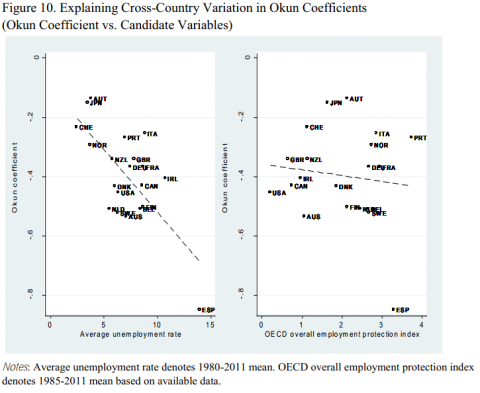Casey Mulligan would very much like you to believe it does.
“cutting unemployment insurance would increase employment, as it would end payments for people who fail to find work and would reduce the cushion provided after layoffs.”
Here’s one pretty well-done data point (several, actually) suggesting that he’s wrong:
In theory, greater employment protection should dampen the effects of output movements on employment and therefore reduce the Okun coefficient. In Figure 10 (right panel), we test this idea by plotting the coefficient against the OECD’s overall EPL index (averaged over 1985-2008, the period for which it is available). The relationship has the wrong sign, and it is statistically insignificant.[9]
[9] For New Zealand, the EPL index is available over 1990-2008. We also find no relationship between the Okun coefficient and the various components of the EPL index.
Cross-posted at Angry Bear.

Comments
2 responses to “Does Unemployment Insurance Explain (and Cause) High Unemployment?”
I’m trying to understand this – do you have a plain English version explaining the charts? Also, how do I contact you? thanks, Ilene
Economists like other professions like to mask simplicity behind a curtain of obscure terms and acronyms.
The EPL index is not just a measure of how well players are preforming in the top flight of English football (soccer,) the English Premier League, it also stands for the Employment Protection Legislation index. This is a measure of, among other things, how much unemployment compensation a country pays.
The Okun coefficient is defined as how much employment changes in response to a 1% change in GDP.
If there is a relationship between the amount of unemployment compensation and the rate of the change in employment it should show up in this comparison. The countries with a high Employment Protection Legislation index, the countries with higher unemployment compensation, should have a lower Okun coefficient, fewer people are willing to give up their unemployment compensation to go to work when the economy improves.
There is no obvious relationship though.